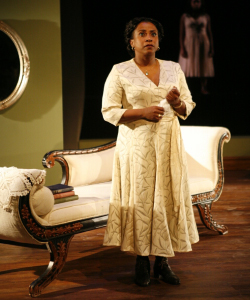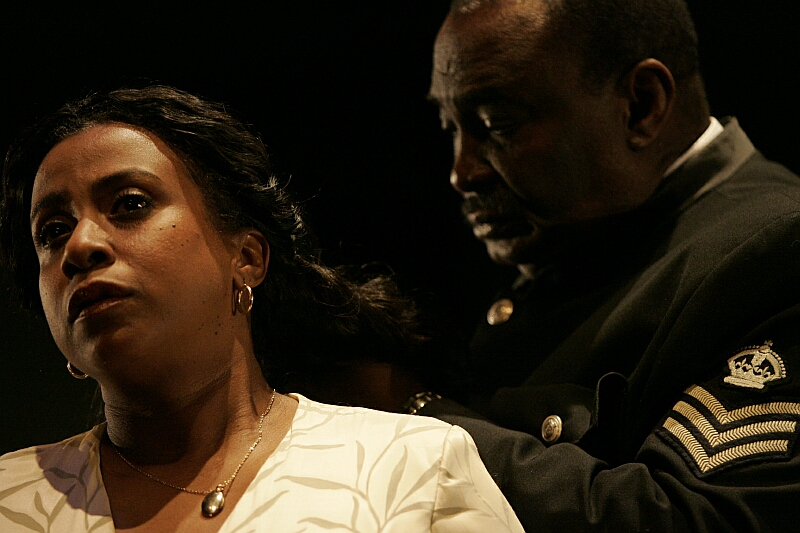The "Polished Hoe" interview with Alison Sealy-Smith

>> Photo by David Hou
The latest theatrical adaptation by Obsidian Theatre of Austin Clarke’s Giller award-winning novel, The Polished Hoe, officially opens tonight at the Enwave Theatre. The Polished Hoe is set in 1952, on the post-colonial West Indian island of Bimshire. The name Bimshire comes from a Bajan dialect term for Barbados. A woman named Mary-Mathilda (played by Alison Sealy-Smith) reveals to a slightly bewitched police officer, Percy, how she came to murder Mr Belfeels – one of the island’s most powerful and ruthless sugar plantation owners. Mary-Mathilda had been his mistress and had given him is only son, Wilberforce, who was a successful doctor on the island.
While the post-colonial political undertones of these times may not be so obviously outlined in The Polished Hoe as one might find in Austin Clarke’s Growing Up Stupid Under the Union Jack, we are still uncovering the subtle layers of “Little England’s” tortured contradictions. My truly enlightening conversation with Alison Sealy-Smith, who brilliantly reprises her role as Mary-Mathilda, revealed many undercurrents, artfully woven into The Polished Hoe, that are still lingering in Barbadian society and the African Diaspora as a whole.
Sealy-Smith contends that this theatrical adaptation of Clarke’s novel is quite different from the book in the sense that “it boils everything down to its essence.” In response to my question of what brings her back to this play, Alison Sealy-Smith says that part of it is the fact that The Polished Hoe tells a story about the Caribbean that hasn’t really been told. That is, we all have a rather idyllic picture of the Caribbean nowadays with the iconoclast imagery of Bob Marley, reggae music, beautiful women and beautiful white sand beaches. However, the journey from slavery, through its abolition, to these modern-day independent and self-reliant islands is somewhat missing.
“That is a journey that I think that Mary-Mathilda can take us on” Alison Sealy-Smith says. But she cautions: “I think history lessons are kind of boring. I don’t know that I really want to come into a theatre for somebody to give me a history lesson on post-colonial Caribbean ethos. … Who needs that?”
Indeed, Mary-Mathilda's experience, described in Austin Clarke’s The Polished Hoe, is, according to Sealy-Smith, “a voice we had not actually heard before.” She adds: “[People] often say that there’s nothing new under the sun but, of course, for all of us in theatre seeking to tell stories … what we’re looking for is a story that has not actually been told.” This untold story of Mary-Mathilda resonates with Alison Sealy-Smith not only as an actor and a Barbadian but also as a Black woman.
“All these contradictions that this woman was. To see a Black woman in the setting of a plantation house where she is actually the mistress and then to figure out how she got there was absolutely compelling for me. I wanted to get on that journey as a woman and as an actor. I had to figure that out. And then, as a Barbadian, what you started to realize is that, if you wanted to be metaphoric about it, the book and hopefully the play hints at that, is about a side of Barbados society, a side of the Caribbean, that we have not actually really seen. It felt to me that we have an instinct for what slavery was like. Even if we haven’t been told about what slavery was like in the Caribbean, we certainly have around us enough images of Black work and slavery that we have an icon in our head of what slavery means. … But if we can manage [to delve into] this woman’s very personal, and slightly anguished, journey from fieldhand to mistress of the great house. If we can somehow get a feeling, an inkling, of what it was like to bring the Caribbean into being. What it meant to move from slavery to full independence, then I think we’ve done our job. It shouldn’t happen so much as an intellectual exercise.” as Sealy-Smith elaborates.
What the play seeks to convey is essentially the coming of age of a people and all the aspirations and contradictions inherent with the shedding of a colonial identity through the personal odyssey of Mary-Mathilda. Alison Sealy-Smith keeps returning throughout the interview to the concept of “the cost” of independence and liberation – real or illusory. Expanding on this notion, Sealy-Smith says: “Part of what I think The Polished Hoe does is … point out to us what the cost is. What price women pay to get something to be and to raise the sons to afford the kind of opportunities for somebody like Wilberforce to go away and study and be a doctor of tropical medicine and all of that kind of stuff.”

>> Photo by David Hou
“I’m not a Black woman,” I say to her, but, somewhat playing the devil’s advocate, I point out to Sealy-Smith how Black men often bemoan how Black women seem to somehow have it easier than their brethren climbing the modern-day corporate ladder for instance. It may be perceived that women are less of a threat to the powers that be. We also discuss, in passing, her award-winning portrayal of another aspect of the Black woman’s experience in her role as Billie in Djanet Sears’ Harlem Duet -- in which case, the Black woman’s experience is of being abandoned as the symbol of that same oppression.
She answers: “I guess it’s interesting … Djanet, as a Black woman, was examining this idea because basically Harlem Duet, in its simplest form, is a break-up story. The relationship ends, the woman gets dumped, and what she has managed to do, of course, is turn on it a lens of racism internalized and outward. It is interesting that a man, a Black man, through Austin Clarke [has done similar service] and his story, I think, has actually helped. … I feel sometimes as though we pay almost lip service to this idea of what Black women have done for the race. We talk about it all the time. Like: “What would we be without Black mothers, where would we be?” And there is, I would imagine, and I am not a Black male, but I guess I can kind of understand about sort of the resentment issue about how much Black women have done and how it seems just easier for them to get things done. But do we actually think about the cost? To her? Or do we only ever look at the benefits? Do we only ever see the community that she has managed to keep together? Or the opportunities that she has afforded her sons or whatever? So part of what The Polished Hoe does is that it makes you look at the cost, at the price, that women pay.
I wanted to be very careful that Mary-Mathilda is not seen as another victim … [as in] women who have been exploited sexually and otherwise. That’s been done, and, like I said at the top, what interested me was the idea of doing something a little bit new. Although I think that Mary-Mathilda is as easily categorized as a victim of White oppression or male sexual exploitation, as it might seem on the surface, I think if we have done our job right in terms of what we’ve managed to pull from the book and put into the play, we should be questioning some of her choices.
Tying back the story of Mary-Mathilda to the broader Caribbean post-colonial context, Alison Sealy-Smith points out:
“What I am hoping is that at some point, when people leave [the theatre], and they’re sitting at the cafes and the bars along their way home or in the car or on the streetcar, that part of what they’re talking about is (and maybe this will be more apparent to those of us of Caribbean extraction, but I hope other people see it too) what does this mean about the price that the Caribbean have paid for being these shining jewels of the Caribbean sea who now reap huge benefits from tourism dollars?
Somebody was telling me the other day that Barbados has been called “the most successful Black-run country on the planet.” I don’t know where they got that from. I don’t know what that’s based on. But I would just say that whatever island whose coming out of slavery … with that particular label, it behooves us all to look at how they got there and the price that was paid to get there. We don’t get something for nothing. … I don’t think you come to the theatre with a bunch of questions and by the end of The Polished Hoe, you’re suddenly going to understand the Black woman (laughs) or all of Caribbean history a lot more. Maybe but that’s not my job. I think is probably to tell the audience to maybe start asking questions that may not have occurred to them before about the Black woman, about the Caribbean experience.





Comments powered by CComment